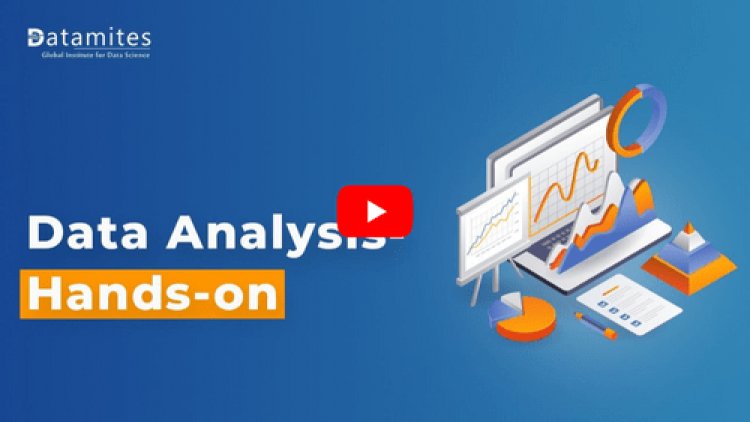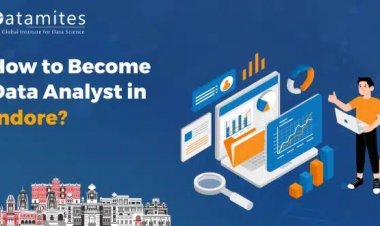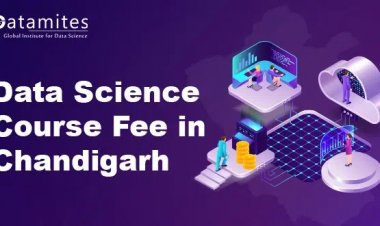How to Become a Data Analyst in United Kingdom?

Becoming a data analyst in UK requires a combination of education, practical skills, and experience. Data analysts play a critical role in interpreting and extracting insights from large datasets, helping organizations make data-driven decisions and solve complex problems. To embark on a data analytics career in UK, individuals typically pursue a relevant bachelor’s degree in fields such as mathematics, statistics, computer science, or data science. Additionally, acquiring proficiency in data analysis tools, programming languages (such as Python or R), and data visualization software is crucial. Gaining hands-on experience through internships, participating in live projects, or working on personal data-related projects can further strengthen one’s skills and understanding of the field.
Defining Data Analytics
Data analytics refers to the process of examining, transforming, and interpreting large volumes of data to uncover meaningful insights, patterns, and trends. It involves applying various statistical and mathematical techniques, as well as using specialized software tools, to analyze data sets and extract valuable information. According to a Precedence Research Report, the global data analytics market was valued at USD 41.39 billion in 2022 and is expected to reach approximately USD 346.33 billion by 2030, with a projected compound annual growth rate (CAGR) of 30.41% during the forecast period from 2022 to 2030.
According to the US Bureau of Labor Statistics, there is a projected growth of 23% in the demand for data analytics jobs from 2021 to 2031. Data analytics encompasses a wide range of methods and approaches to understand and make sense of data. It involves collecting and organizing data, cleaning and preprocessing it to ensure accuracy and consistency, and then applying different analytical techniques to derive insights. Data analytics training in UK is a popular field of study that focuses on teaching students how to apply various analytical techniques to extract insights from data sets.
Explore the following articles:
- Data Analytics for the E-commerce Sector
- Data Analytics in Logistics
- Data Analytics Influencing the Educational Sector
Advantages of Pursuing a Data Analytics Career in UK?
A Data analyst career in UK provides numerous benefits. The UK has a thriving industry that is witnessing exponential growth in data-driven decision-making. This trend creates a high demand for skilled data analysts across various sectors, opening up ample job opportunities. Moreover, UK’s robust technology sector and innovative environment foster continuous advancements in data analytics tools and methodologies, allowing professionals to stay at the forefront of the field.
The salary of data analysts in UK ranges from GBP 28,979 per year according to a PayScale report that reflects the value placed on their expertise. Additionally, working in UK exposes individuals to diverse industries, such as finance, healthcare, retail, and marketing, providing the flexibility to choose a specialization aligned with their interests and career goals. The country’s strong professional network and frequent industry events also offer excellent networking opportunities, enabling professionals to build connections and stay updated on the latest industry trends.
Here is the list of major cities for data analyst salary in UK:
- The salary of a Data Analyst in Birmingham ranges from GBP 32,149 per year according to a Glassdoor report.
- The salary of a Data Analyst in Bristol ranges from GBP 33,239 per year according to a Glassdoor report.
- The salary of a Data Analyst in Edinburgh ranges from GBP 30401 per year according to a PayScale report.
- The salary of a Data Analyst in Glasgow ranges from GBP 26,328 per year according to a PayScale report.
- The salary of a Data Analyst in Liverpool ranges from GBP30,752 per year according to a Glassdoor report.
- The salary of a Data Analyst in London ranges from GBP 33,476 per year according to a PayScale report.
The Increasing Demand for Data Analytics in the UK
Data analytics is in high demand in UK across various sectors, including healthcare, finance, education, retail, and manufacturing. Here’s why:
Healthcare:
In the healthcare sector, data analytics plays a crucial role in improving patient outcomes, optimizing resource allocation, and enhancing operational efficiency.
Finance:
Data analytics is essential in the finance industry for risk assessment, fraud detection, and investment decision-making. Financial institutions analyze vast amounts of data, including market trends, customer behaviour, and transaction records, to identify potential risks, develop predictive models, and optimize investment portfolios.
Education:
In the education sector, data analytics provides valuable insights to enhance student performance, personalized learning, and operational efficiency. By analyzing student data, such as academic performance, attendance records, and engagement metrics, educational institutions can identify areas of improvement, develop targeted interventions, and tailor teaching approaches to meet individual student needs.
Retail:
Data analytics is transforming the retail industry by enabling businesses to understand customer preferences, optimize inventory management, and enhance marketing strategies. By analyzing customer data, including purchase history, browsing behaviour, and demographic information, retailers can personalize marketing campaigns, recommend relevant products, and improve customer experiences.
Manufacturing:
The manufacturing industry is undergoing a change because to data analytics, which enables businesses to streamline operations, cut costs, and enhance product quality. Through the analysis of sensor data, machine logs, and production line performance, manufacturers can identify inefficiencies, predict maintenance needs, and optimize production schedules.
Data analytics is in high demand across various sectors in United Kingdom due to its ability to unlock valuable insights, improve decision-making, and drive operational efficiency. The increasing availability of data, advancements in technology, and recognition of the importance of data-driven strategies have contributed to the growing demand for skilled data analysts in these industries.
Read the following articles:
- Become a Data Analyst in United Arab Emirates
- Become a Data Analyst in Australia
- Become a Data Analyst in Singapore
Steps to Become a Data Analyst in the UK:
To become a data analyst in UK, you can follow these general steps:
- Education Qualification: Most employers require a bachelor’s degree in a field such as mathematics, statistics, computer science, or a related discipline. Consider pursuing a degree that offers coursework in data analysis, data science, programming, and statistical analysis.
- Stay updated with industry trends: Data analysis is a rapidly evolving field, so it’s important to stay up-to-date with the latest tools, techniques, and trends. Follow industry blogs, read books and research papers, and enroll in online courses or certifications to enhance your knowledge and skills.
- Hands-on Learning Experience: Hands-on learning experience is invaluable for data analytics professionals. They can use it to improve their practical abilities by putting their theoretical knowledge to use in real-world situations.
- Live-project internship: Live project internships provide valuable opportunities for data analytics professionals to gain practical experience in real-world scenarios. Engaging in live projects allows interns to apply their knowledge and skills to solve actual data challenges faced by organizations.
- Communication Skills: Strong communication skills are vital for data analytics professionals. Clear and concise communication enables them to explain complex data concepts to non-technical stakeholders. Effective communication fosters collaboration and ensures that data-driven insights are understood and utilized for informed decision-making.
- Certifications: Certification in data analytics validates one’s proficiency and knowledge in the field. It demonstrates a commitment to professional development and staying up-to-date with industry best practices. Data analytics certifications, such as those offered by reputable organizations, provide credibility and enhance job prospects.
- Resume Preparation: When preparing a resume for a data analytics role, it’s important to highlight relevant skills and experience. Include technical skills such as programming languages (Python, R), data querying (SQL), and analytics tools (Tableau, Power BI). Emphasize your experience with data analysis, statistical modeling, and data visualization projects.
- Apply for data analyst positions: Start searching for job openings in data analysis. Use job portals, professional networking platforms like LinkedIn, and the websites of companies that interest you. Make sure to emphasise your relevant abilities and experiences in both your CV and cover letter.
The path to becoming a data analyst can vary, and there may be different requirements and preferences among employers. Adapt these steps to your specific situation and keep an eye out for opportunities that align with your interests and goals.
Read the following articles:
- Become a Data Analyst in South Africa
- Become a Data Analyst in India
- Become a Data Analyst in Canada
How is DataMites providing a Certified Data Analyst Course in UK?
DataMites is a global training institute that offers wide courses like Python, Artificial Intelligence, Data Science, Deep Learning and data analytics training in UK. DataMites offers the best course in data analytics, the Certified Data Analyst Course in UK, covering a wide range of topics including data analysis, data visualization, machine learning, and statistical modeling. The courses of DataMites are accredited by IABAC and the students get the renowned global IABAC certification at the end of the program.
Here are the highlights of the Certified Data Analyst Course in UK provided by DataMites:
- Ashok Veda and Faculty: DataMites proudly presents Ashok Veda as a globally reputed AI expert with an impressive 19 years of experience in analytics and data science. With a proven track record of delivering exceptional results and driving innovation, this expert brings a wealth of knowledge and expertise to the table. He serves extensive industry experience and spans diverse sectors, including finance, healthcare, and technology. The faculty of DataMites successfully led numerous projects, leveraging cutting-edge AI techniques to solve complex business challenges and unlock valuable insights from data. With their guidance and mentorship, DataMites ensures that Ashok Veda provides world-class training and stays at the forefront of AI advancements.
- Course Overview: The Certified Data Analyst Course aims to provide participants with the necessary skills and knowledge to analyze and interpret data effectively. It covers various concepts, tools, and techniques used in data analysis.
- Curriculum: The course typically covers topics such as data manipulation, data visualization, statistical analysis, predictive modeling, data mining, and database management. It may also include modules on programming languages like Python or R, as they are commonly used in data analysis.
- Flexible Schedule: DataMites understands the need for flexibility in learning and offers courses that accommodate various schedules. DataMites provides options for online data analytics training in UK and self-paced learning which allows participants to access course materials and lectures at their convenience.
- Internship opportunities: DataMites provides internship opportunities for aspiring data analytics professionals, enabling them to gain practical experience and apply their knowledge in a real-world setting. Through strategic collaborations with industry partners, DataMites creates avenues for students to secure internships in reputed organizations.
- Industry-relevant Tools: DataMites ensures its students have access to industry-relevant tools through various channels, including licensed software and widely-used tools like Excel, SQL, Tableau, Power BI, and others. Practical exercises and real-world projects are incorporated into the curriculum, enabling students to apply these tools and gain hands-on experience, ultimately becoming proficient in using them. By combining access to tools and practical applications, DataMites equips its students with the essential tools and skills required in the industry.
- Certification: Upon successful completion of the course, participants may receive certification from DataMites or a recognized accreditation body. Data Analytics certification in UK validates their knowledge and skills as data analysts, enhancing their professional credentials.
- Affordable fees– DataMites offers affordable fees for its data analytics courses, ensuring accessibility to quality education in the field. They provide cost-effective options without compromising on the content or learning experience. The Certified Data Analyst Course Fee in UK range from GBP 429 to GBP 1140.
Certified Data Analyst Course

Summary:
In conclusion, becoming a data analytics professional in UK requires a combination of educational qualifications, practical experience, and continuous learning. The first step is to acquire a relevant degree or certification in data analytics or a related field. Universities and institutions in UK offer specialized programs that equip individuals with the necessary skills and knowledge. Additionally, gaining practical experience through internships, projects, or industry collaborations is crucial to apply theoretical knowledge in real-world scenarios. Continuous learning and staying updated with the latest tools, techniques, and trends in data analytics are also essential in this rapidly evolving field. Joining professional networks, attending workshops, and engaging in online courses can contribute to professional growth and enhance job prospects. Finally, showcasing one’s skills and experience through a well-crafted resume and participating in interviews and assessment processes play a vital role in securing a career in data analytics in UK. With dedication, perseverance, and a passion for data-driven insights, individuals can embark on a successful journey as data analytics professionals in UK.
Data Analyst vs Data Engineer

Learn Data Analysis with the Help of Python






